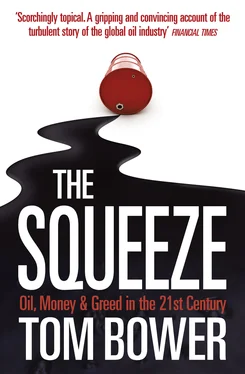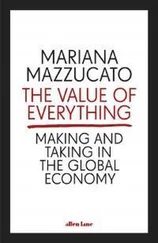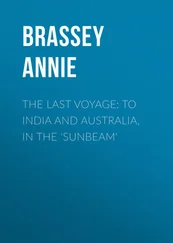Fearful of continuing low prices, the oil majors’ enthusiasm for exploration and improved production evaporated. Less glamorous, but nevertheless critical to the future, the profits from refining oil began a long, permanent decline. Convinced that low prices would last for years, the major oil companies sharply reduced their investment. ‘It’s the end of the party,’ said Peter Gignoux, noting that the world could no longer rely on the Seven Sisters as guaranteed oil suppliers. Liberated from that responsibility, the major oil companies resorted to skulduggery to reduce their taxes. By churning trades of oil to reduce Brent prices to absurdly low rates, they could reap lucrative tax advantages from the 15-day market. In 1986 Transnor, a Bermudan company, claimed to be a victim of a squeeze over Brent oil orchestrated by Exxon, BP and other oil majors. To seek relief, its directors litigated against the companies in America.
The oil companies became alarmed. The Brent trade was an unregulated international business, not subject to American or British laws. Squeezing Transnor was part of the game to manipulate prices and secure tax advantages. The companies’ initial ploy in the American court was to persuade the judge that 15-day Brent was similar to ‘a forward contract’ used by farmers to secure guaranteed prices for their crops, and was therefore not subject to the Commodities Futures Trading Commission (CFTC), the American regulator.
Created by Congress in 1974 ‘to protect market users and the public from fraud, manipulation and abusive practices’ in the commodities trade, the CFTC initially supervised 13 commodity exchanges with staff recruited from Congress, especially the agricultural committees. Political favourites, some with limited experience, were appointed commissioners to supervise those monitoring the markets. Relying on the traders’ reports submitted to Nymex as its primary tool to identify suspicious price movements, the agency was deprived of adequate funding by Congress, undermining its prestige from the outset. After 1984, as the trade of contracts tripled and the trade in options multiplied tenfold, the 600 staff struggledwith an inadequate computer system and a falling budget to identify market manipulation and excessive speculation in 25 commodities, the value of which was growing towards $5.4 trillion a month. That bureaucracy was anathema to Exxon and BP. The oil majors adamantly denied the agency’s authority over their business.
Transnor argued the opposite. Its agreement to buy Brent oil, the company argued, was a speculative or hedging ‘futures contract’, which was subject to American law and the CFTC. In 1990 Judge William Conner found in favour of Transnor, ruling that trading Brent was illegal in America. The oil majors were dismayed. Oil traders, they argued, were big enough to look after themselves without a regulator’s protection. To persuade the US government of their cause, they stopped trading with American companies and lobbied the director of the CFTC in Washington to reverse the judge’s ruling. The CFTC, a lackadaisical regulator caring primarily for farmers and agricultural contracts, had never experienced the pressure of oil lobbyists. Within days the companies declared victory. Fifteen-day Brent was declared to be a ‘forward contract’ and beyond regulation. The oil companies could administer their own ‘justice’, especially when they fell victim to a squeeze of Brent oil orchestrated by John Deuss, the sole owner of Transworld.
Transworld was based in Bermuda, with trading offices in London and Houston, and Deuss’s micro-management stimulated the sentiment among his traders that the only compensation for suffering his obnoxious manner was the unique lessons in oil trading he could provide. Oil spikes, Deuss believed, occurred once every decade, and in the intervening years traders should tread water, manipulating the market with squeezes. The best squeezes, he boasted, passed unnoticed.
During 1986, Deuss decided to execute a monster squeeze on the Brent market. Mike Loya, Transworld’s manager in London, was delegated to mastermind the purchase of more oil than was actually produced in the North Sea. In that speculative market, the cargo of a tanker carrying 600,000 barrels of North Sea oil was normally sold and resold a hundred times before it reached a refinery. If prices were falling, traders who bought at higher prices were exposed to losses, while those selling short would expect to profit. Starting in a small way, Deuss and his traders in London bought increasing amounts of 15-day Brent every month. Seeing that by tightening the market they were pushing prices upwards and earning extra dollars, they became bolder. Summer 1987 was the self-styled ‘Eureka Moment’. To allow maintenance work, monthly oil production had been reduced to 32 cargoes. Traders at Shell, Exxon and BP had as usual sold 15-day cargoes, expecting to buy back at the end of the period any oil they needed for their refineries. Now, however, their offers were ignored. Mike Loya, the traders noticed, had bought over 40 cargoes, so owned more oil than the fields produced. And having bought everything, Loya was not selling. Transworld’s squeeze was felt in London and New York. Prices rose and the protests grew. The oil majors needed Brent to produce specific lubricants which were unobtainable from other North Sea crudes. Without that oil, the refineries could not operate. Contractually bound to supply Brent, they were compelled to pay Transworld an extra $2 a barrel, earning Deuss $10 million profit for one month’s work. Unexpectedly, the majors then suffered a second blow. Because of the complexities of oil trading, while 15-day Brent prices increased, Dated Brent prices fell. That fall directly cut the prices of oil produced in West Africa and the Gulf, so the producers lost money on supplying it to other refineries. Deuss’s squeeze had caused chaos. ‘Very painful,’ admitted BP’s senior trader, suspecting that the squeeze had been profitably shadowed by Goldman Sachs and Marc Rich.
After Loya’s summer coup, Transworld’s traders earned more profits from smaller squeezes until, in December 1987, Deuss believed he had the information to strike a spectacular bonanza. Focused on an audacious coup against the oil companies, he was convinced by the golden fable that no regulator, stock exchange or even country could control the oil market. Like every trader, Deuss nurtured his OPEC contacts, and few were more important than Mana Said al Otaiba, the oil minister of the UAE, who was also a co-owner with Deuss of a refinery in Pennsylvania. Al Otaiba convinced Deuss that in order to force up oil prices, OPEC would agree at its meeting in January 1988 to significantly cut production. If OPEC’s production fell, Brent prices would rise.
‘Buy Brent,’ Deuss ordered. Transworld’s traders in London bought 41 out of 42 Brent cargoes for $425 million, but prices barely moved. No other traders appeared to believe that OPEC would cut production. Then prices began to fall. ‘Buy more,’ Deuss ordered, to shore up his position. To achieve a squeeze, he simultaneously also bought Brent oil from rival traders for delivery in the same period. Those traders, unaware of Deuss’s plot, had expected to buy those cargoes from BP and Shell once they were produced. In the common usage, the traders were ‘short’ – selling oil without owning it. As the moment of delivery approached, Deuss demanded delivery of the oil. The unsuspecting traders discovered that no oil was available. Deuss expected to hear screams appealing for mercy. The traders faced two options: either pay Deuss a penalty for defaulting on their contracts, or buy their cargoes from Deuss in order to resell them to him, inevitably suffering a hefty loss. But instead of hearing screams, Deuss became perplexed by the ‘shorts” silence. Unknown to him, Peter Ward, Shell’s trader, had agreed with Exxon to sabotage the squeeze by producing extra oil. ‘Deuss is a buccaneer,’ Ward declared. ‘Let’s teach him a lesson.’ There was, he decided, a fine line between combat trading and corrupt trading.
Читать дальше











![John Bruce - The Lettsomian Lectures on Diseases and Disorders of the Heart and Arteries in Middle and Advanced Life [1900-1901]](/books/749387/john-bruce-the-lettsomian-lectures-on-diseases-and-disorders-of-the-heart-and-arteries-in-middle-and-advanced-life-1900-1901-thumb.webp)
